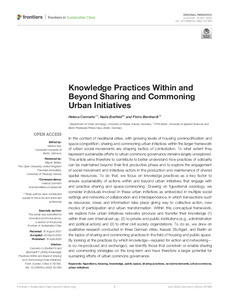| dc.date.accessioned | 2022-05-06T16:24:38Z | |
| dc.date.available | 2022-05-06T16:24:38Z | |
| dc.date.issued | 2022-04-18 | |
| dc.identifier | doi:10.17170/kobra-202205066150 | |
| dc.identifier.uri | http://hdl.handle.net/123456789/13818 | |
| dc.description.sponsorship | Gefördert durch den Publikationsfonds der Universität Kassel | ger |
| dc.language.iso | eng | eng |
| dc.rights | Namensnennung 4.0 International | * |
| dc.rights.uri | http://creativecommons.org/licenses/by/4.0/ | * |
| dc.subject | figurations | eng |
| dc.subject | housing | eng |
| dc.subject | knowledge | eng |
| dc.subject | public space | eng |
| dc.subject | sharing practices | eng |
| dc.subject | social movements | eng |
| dc.subject | urban commons | eng |
| dc.subject | urban initiatives | eng |
| dc.subject.ddc | 710 | |
| dc.title | Knowledge Practices Within and Beyond Sharing and Commoning Urban Initiatives | eng |
| dc.type | Aufsatz | |
| dcterms.abstract | In the context of neoliberal cities, with growing levels of housing commodification and space competition, sharing and commoning urban initiatives within the larger framework of urban social movements are shaping tactics of contestation. To what extent they represent sustainable efforts to urban commons governance remains largely unexplored. This article aims therefore to contribute to better understand how practices of solidarity can be maintained beyond their first productive phase and to explore the engagement of social movement and initiatives actors in the production and maintenance of shared spatial resources. To do that, we focus on knowledge practices as a key factor to ensure sustainability of actions within and beyond urban initiatives that engage with and practice sharing and space-commoning. Drawing on figurational sociology, we consider individuals involved in these urban initiatives as embedded in multiple social settings and networks of collaboration and interdependence, in which transactions such as resources, ideas and information take place giving way to collective action, new modes of participation and urban transformation. Within this conceptual framework, we explore how urban initiatives networks produce and transfer their knowledge (1) within their own internal set-up, (2) to private and public institutions (e.g., administration and political actors) and (3) to other civil society organizations. To do so, we draw on qualitative research conducted in three German cities, Kassel, Stuttgart, and Berlin on the topics of sharing and commoning practices in the field of housing and public space. By looking at the practices by which knowledge—required for action and networking—is co-/re-produced and exchanged, we identify those that constrain or enable sharing and commoning strategies on the long-term and have therefore a larger potential for sustaining efforts of urban commons governance. | eng |
| dcterms.accessRights | open access | |
| dcterms.creator | Cermeño, Helena | |
| dcterms.creator | Bretfeld, Nada | |
| dcterms.creator | Bernhardt, Floris | |
| dc.relation.doi | doi:10.3389/frsc.2022.767365 | |
| dc.subject.swd | Gestaltung | ger |
| dc.subject.swd | Unterkunft | ger |
| dc.subject.swd | Wissen | ger |
| dc.subject.swd | Öffentlicher Raum | ger |
| dc.subject.swd | Soziale Bewegung | ger |
| dc.subject.swd | Verstädterung | ger |
| dc.subject.swd | Nachhaltigkeit | ger |
| dc.subject.swd | Teilen | ger |
| dc.type.version | publishedVersion | |
| dcterms.source.identifier | eissn:2624-9634 | |
| dcterms.source.journal | Frontiers in Sustainable Cities | eng |
| dcterms.source.volume | Volume 4 | |
| kup.iskup | false | |
| dcterms.source.articlenumber | 767365 | |


